I can write with almost complete certainty that Lavonte David is going to become the second-leading tackler in Tampa Bay Buccaneers franchise history this Sunday.
David currently has 1,427 regular season tackles, just one fewer than the 1,428 that Hall of Fame cornerback RondéBarber amassed in his career. So David, obviously, needs two more to leap over Barber into second place. Lavonte David has played 175 regular season games in his career and this is how many times he's finished a game with fewer than two tackles:
One.
David has also played in seven postseason games and never had fewer than two tackles in any of them either, so you can call it 181 out of 182 if you want, but those stats are not included in the player's all-time totals. However, you get the point. Barring an injury, David will be getting those two tackles on Sunday against the 49ers.
Now, first place on the list is probably out of reach, as I explained in last week's mailbag. Derrick Brooks likely put that out of reach with his incredible total of 2,198 tackles. That said, there is another category in which David can catch Brooks, and in fact, has a very good shot of doing so by the end of this season. Right now, David leads all Buccaneer defenders with 83 total tackles. A hot month after the bye week – 50 tackles in four games – helped him pull away a bit from safety Ryan Neal and linebacker Devin White, both of whom are at 60. Antoine Winfield Jr. is next at 55.
Before 2023, David had played 11 seasons as a Buccaneer, and in eight of them he finished as the team's leading tackler. Kwon Alexander beat him out once and White has done so twice. (I must point out that David and White actually tied for the team lead last year with 124 tackles each, but I still count that as leading the team.)
Brooks is the only player in team history to lead the team in tackles for a season more than eight times, as he did it nine times. In fact, Brooks is the only player in franchise annals to lead the Bucs in any of the major stat categories in more than eight different seasons. Let's take a closer look at the seasonal leaders in six of those categories, beginning with the one we're currently examining.
Tackles.
In 47 years prior to 2023, 18 different players have led the team in tackles in at least one season, 16 of whom were linebackers. The exceptions were safeties Harry Hamilton in 1990 and Marty Carter in 1992. After Brooks with nine and David with eight come Richard "Batman" Wood, Hardy Nickerson and Barrett Ruud with four each. There was a six-year stretch from 1988 to 1993 in which a different player led the team each season, but the last of those six was Nickerson and he put a stop to that.
Sacks.
You will not be surprised to know that Hall of Famer Lee Roy Selmon has this franchise record with eight seasons of leading the team in sacks. (Again, tying for the team lead counts.) That's pretty good considering he played a total of nine seasons. Simeon Rice and Gerald McCoy are next on the list with five each, followed by Hall of Famer Warren Sapp with four. There have been two seasons where it was a tie between two people and one with a tie between three people. That's part of why there have been 25 different people who can say they led the Bucs in sacks for a season.
Passing Yards.
There are 20 different quarterbacks who have led the Bucs in passing yards for at least one season, but there's no clear winner. There isn't one passer who has held the job long enough to pull away from the pack, so we end up with four of them tied for first, and most Bucs could probably guess the answers pretty easily: Doug Williams, Vinny Testaverde, Trent Dilfer and Jameis Winston, with five each. Those are first-round draft picks by the Buccaneers, as was Josh Freeman, who is next on the list with four. Tom Brady , Brad Johnson and Steve DeBerg all had three each, but DeBerg is the only player to lead the team in multiple seasons non-consecutively.
Rushing Yards.
It's the same number of seasonal leaders as with passing, as 20 different players have led the Bucs in rushing yards for a season. James Wilder did it most often, with six season wins. Ricky Bell and Warrick Dunn had four each, with Dunn catching Bell when he came back to the team for one final season in 2008 after six years in Atlanta.
Receptions.
Take a wild guess. Yes, Mike Evans is at the top of the list with five seasons (so far) of leading the team in receptions. Now take a wilder guess…as in James Wilder. He also led the Buccaneers in receptions in five different seasons, so Evans has company at the top. Nobody else is at four such seasons, though Chris Godwin has three and currently leads the 2023 team with 44, one ahead of Evans. Morris Owens, Lawrence Dawsey, Keyshawn Johnson, Kellen Winslow and Vincent Jackson all did it three times. Four different tight ends have led the Bucs in receiving for at least one season: Winslow, Jimmie Giles, Calvin Magee and Jackie Harris.
Points Scored.
This list is made up of 20 players, 17 of whom were kickers. The exceptions were Owens in 1976, Reggie Cobb in 1992 and Michael Pittman in 2004. You might guess that the leader in the clubhouse would be Martin Gramatica or Donald Igwebuike, but you'd be wrong. It's actually Michael Husted, who did it six times in the Nineties. Gramatica and Igwebuike both had five leading seasons, as did Connor Barth. Matt Bryant did it four times.
Now on to your questions.
A reminder that you can send questions to me any time you want on Twitter (@ScottSBucs) and they're easier to find if you include the hashtag #SSMailbagBucs. We are also now soliciting questions each week on our Instagram page; look for that story on Wednesdays. As always, if you want to get a longer question into the mailbag and would prefer to email your question, you can do so to tbbsocial@buccaneers.nfl.com.
View pictures from Tampa Bay Buccaneers practice on 11/16/2023.

TAMPA, FL - November 16, 2023 - Quarterback Baker Mayfield #6 of the Tampa Bay Buccaneers during practice at AdventHealth Training Center. Photo By Kyle Zedaker/Tampa Bay Buccaneers

TAMPA, FL - November 16, 2023 - Cornerback Zyon McCollum #27 of the Tampa Bay Buccaneers during practice at AdventHealth Training Center. Photo By Kyle Zedaker/Tampa Bay Buccaneers

TAMPA, FL - November 16, 2023 - Defensive Back Josh Hayes #32 of the Tampa Bay Buccaneers during practice at AdventHealth Training Center. Photo By Kyle Zedaker/Tampa Bay Buccaneers
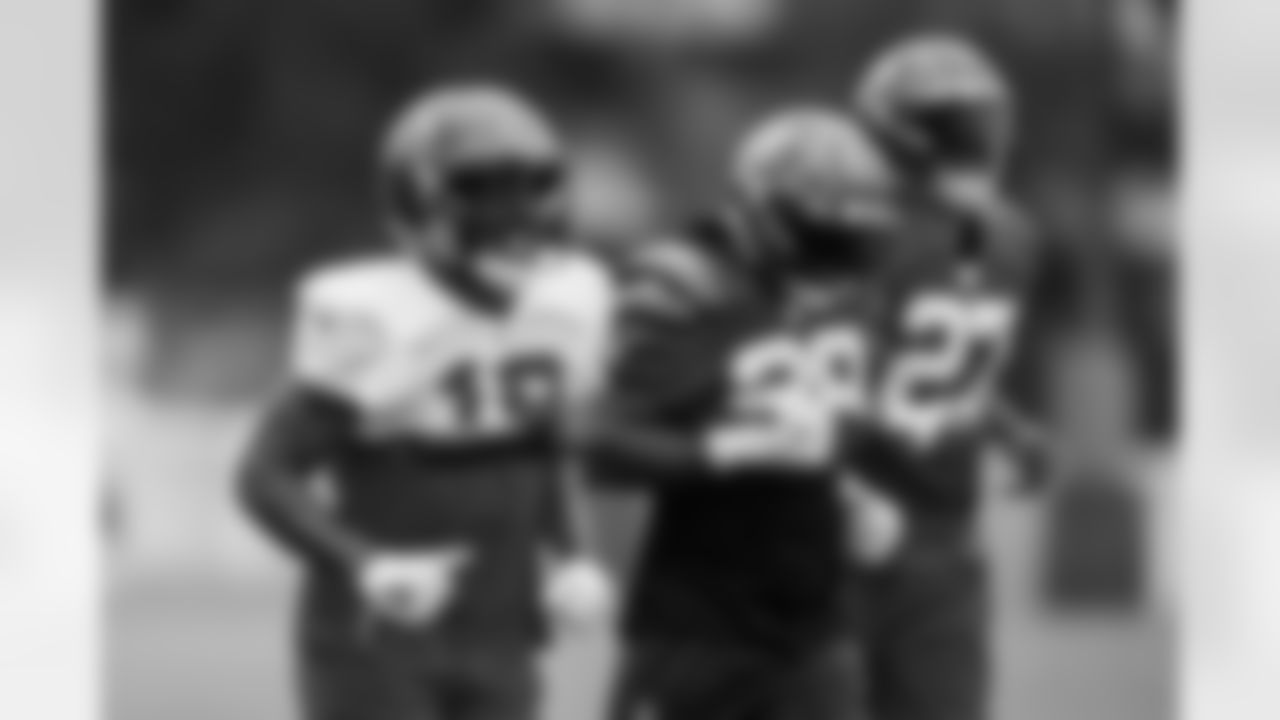
TAMPA, FL - November 16, 2023 - Wide Receiver David Moore #19 of the Tampa Bay Buccaneers during practice at AdventHealth Training Center. Photo By Kyle Zedaker/Tampa Bay Buccaneers

TAMPA, FL - November 16, 2023 - Safety Jaquan Johnson #34 of the Tampa Bay Buccaneers during practice at AdventHealth Training Center. Photo By Kyle Zedaker/Tampa Bay Buccaneers

TAMPA, FL - November 16, 2023 - Cornerback Derrek Pitts #38 of the Tampa Bay Buccaneers during practice at AdventHealth Training Center. Photo By Kyle Zedaker/Tampa Bay Buccaneers

TAMPA, FL - November 16, 2023 - Safety Kaevon Merriweather #26 of the Tampa Bay Buccaneers during practice at AdventHealth Training Center. Photo By Kyle Zedaker/Tampa Bay Buccaneers

TAMPA, FL - November 16, 2023 - Defensive Back Josh Hayes #32 and Cornerback Dee Delaney #30 of the Tampa Bay Buccaneers during practice at AdventHealth Training Center. Photo By Kyle Zedaker/Tampa Bay Buccaneers

TAMPA, FL - November 16, 2023 - Guard Cody Mauch #69 of the Tampa Bay Buccaneers during practice at AdventHealth Training Center. Photo By Kyle Zedaker/Tampa Bay Buccaneers

TAMPA, FL - November 16, 2023 - Safety Antoine Winfield Jr. #31 of the Tampa Bay Buccaneers during practice at AdventHealth Training Center. Photo By Kyle Zedaker/Tampa Bay Buccaneers

TAMPA, FL - November 16, 2023 - Cornerback Carlton Davis #24 of the Tampa Bay Buccaneers during practice at AdventHealth Training Center. Photo By Kyle Zedaker/Tampa Bay Buccaneers

TAMPA, FL - November 16, 2023 - Offensive Coordinator Dave Canales of the Tampa Bay Buccaneers during practice at AdventHealth Training Center. Photo By Kyle Zedaker/Tampa Bay Buccaneers

TAMPA, FL - November 16, 2023 - Quarterback Baker Mayfield #6 of the Tampa Bay Buccaneers during practice at AdventHealth Training Center. Photo By Kyle Zedaker/Tampa Bay Buccaneers

TAMPA, FL - November 16, 2023 - Inside Linebacker Lavonte David #54 of the Tampa Bay Buccaneers during practice at AdventHealth Training Center. Photo By Kyle Zedaker/Tampa Bay Buccaneers

TAMPA, FL - November 16, 2023 - Running Back Chase Edmonds #22 of the Tampa Bay Buccaneers during practice at AdventHealth Training Center. Photo By Kyle Zedaker/Tampa Bay Buccaneers

TAMPA, FL - November 16, 2023 - Tackle Tristan Wirfs #78 of the Tampa Bay Buccaneers during practice at AdventHealth Training Center. Photo By Kyle Zedaker/Tampa Bay Buccaneers

TAMPA, FL - November 16, 2023 - Offensive Lineman Robert Hainsey #70 and Quarterback Baker Mayfield #6 of the Tampa Bay Buccaneers during practice at AdventHealth Training Center. Photo By Kyle Zedaker/Tampa Bay Buccaneers

TAMPA, FL - November 16, 2023 - Running Back Rachaad White #1 and Quarterback Baker Mayfield #6 of the Tampa Bay Buccaneers during practice at AdventHealth Training Center. Photo By Kyle Zedaker/Tampa Bay Buccaneers

TAMPA, FL - November 16, 2023 - Running Back Sean Tucker #44 of the Tampa Bay Buccaneers during practice at AdventHealth Training Center. Photo By Kyle Zedaker/Tampa Bay Buccaneers

TAMPA, FL - November 16, 2023 - Outside Linebacker Joe Tryon-Shoyinka #9 and Tackle Tristan Wirfs #78 of the Tampa Bay Buccaneers during practice at AdventHealth Training Center. Photo By Kyle Zedaker/Tampa Bay Buccaneers

TAMPA, FL - November 16, 2023 - Outside Linebacker Anthony Nelson #98 and Guard Luke Goedeke #67 of the Tampa Bay Buccaneers during practice at AdventHealth Training Center. Photo By Kyle Zedaker/Tampa Bay Buccaneers

TAMPA, FL - November 16, 2023 - Outside Linebacker Yaya Diaby #0 of the Tampa Bay Buccaneers during practice at AdventHealth Training Center. Photo By Kyle Zedaker/Tampa Bay Buccaneers

TAMPA, FL - November 16, 2023 - Outside Linebacker Yaya Diaby #0 and Tackle Brandon Walton #73 of the Tampa Bay Buccaneers during practice at AdventHealth Training Center. Photo By Kyle Zedaker/Tampa Bay Buccaneers

TAMPA, FL - November 16, 2023 - Outside Linebacker Cam Gill #49 of the Tampa Bay Buccaneers during practice at AdventHealth Training Center. Photo By Kyle Zedaker/Tampa Bay Buccaneers

TAMPA, FL - November 16, 2023 - Outside Linebacker Joe Tryon-Shoyinka #9 of the Tampa Bay Buccaneers during practice at AdventHealth Training Center. Photo By Kyle Zedaker/Tampa Bay Buccaneers

TAMPA, FL - November 16, 2023 - Outside Linebacker Cam Gill #49 of the Tampa Bay Buccaneers during practice at AdventHealth Training Center. Photo By Kyle Zedaker/Tampa Bay Buccaneers

TAMPA, FL - November 16, 2023 - Outside Linebacker Shaquil Barrett #7 of the Tampa Bay Buccaneers during practice at AdventHealth Training Center. Photo By Kyle Zedaker/Tampa Bay Buccaneers
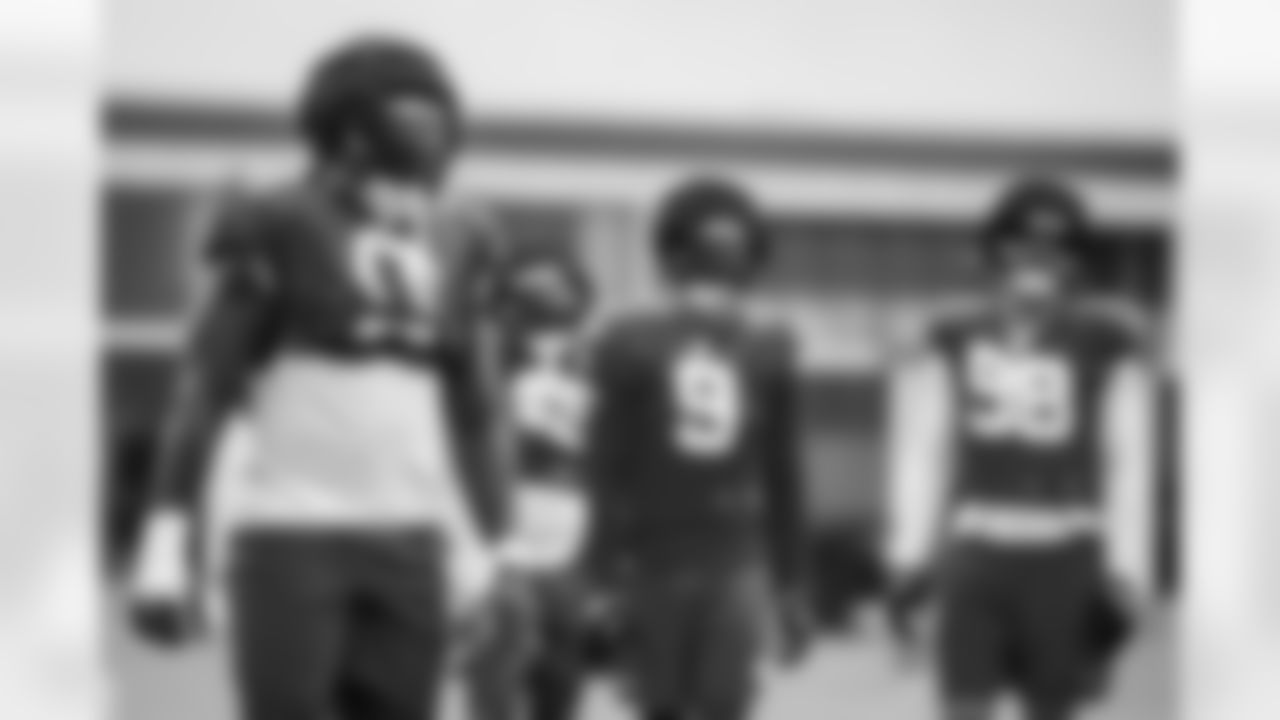
TAMPA, FL - November 16, 2023 - Outside Linebacker Yaya Diaby #0 of the Tampa Bay Buccaneers during practice at AdventHealth Training Center. Photo By Kyle Zedaker/Tampa Bay Buccaneers

TAMPA, FL - November 16, 2023 - Outside Linebacker Yaya Diaby #0 of the Tampa Bay Buccaneers during practice at AdventHealth Training Center. Photo By Kyle Zedaker/Tampa Bay Buccaneers

TAMPA, FL - November 16, 2023 - Outside Linebacker Markees Watts #58 of the Tampa Bay Buccaneers during practice at AdventHealth Training Center. Photo By Kyle Zedaker/Tampa Bay Buccaneers
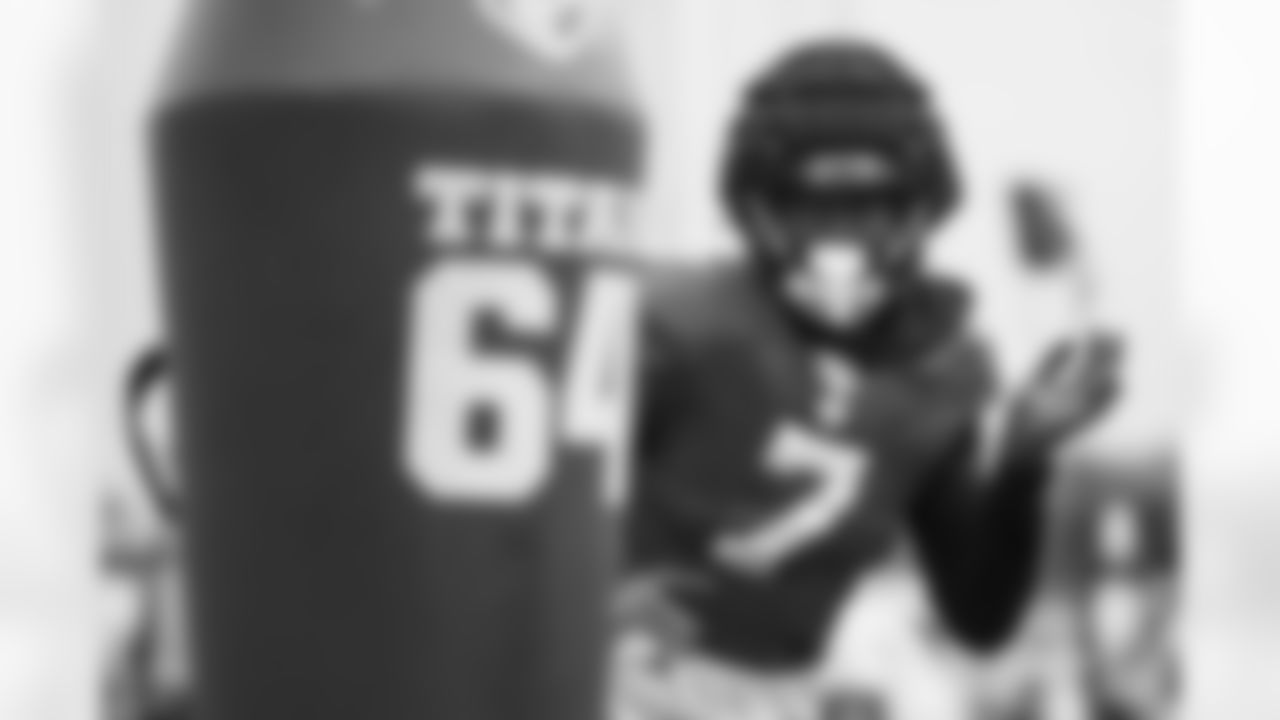
TAMPA, FL - November 16, 2023 - Outside Linebacker Shaquil Barrett #7 of the Tampa Bay Buccaneers during practice at AdventHealth Training Center. Photo By Kyle Zedaker/Tampa Bay Buccaneers

TAMPA, FL - November 16, 2023 - Wide Receiver Mike Evans #13 of the Tampa Bay Buccaneers during practice at AdventHealth Training Center. Photo By Kyle Zedaker/Tampa Bay Buccaneers

TAMPA, FL - November 16, 2023 - Senior Offensive Analyst David Raih and Wide Receiver Chris Godwin #14 of the Tampa Bay Buccaneers during practice at AdventHealth Training Center. Photo By Kyle Zedaker/Tampa Bay Buccaneers

TAMPA, FL - November 16, 2023 - Wide Receiver Mike Evans #13 of the Tampa Bay Buccaneers during practice at AdventHealth Training Center. Photo By Kyle Zedaker/Tampa Bay Buccaneers

TAMPA, FL - November 16, 2023 - Run Game Coordinator/Defensive Line Coach Kacy Rodgers of the Tampa Bay Buccaneers during practice at AdventHealth Training Center. Photo By Kyle Zedaker/Tampa Bay Buccaneers

TAMPA, FL - November 16, 2023 - Safety Antoine Winfield Jr. #31 of the Tampa Bay Buccaneers during practice at AdventHealth Training Center. Photo By Kyle Zedaker/Tampa Bay Buccaneers

TAMPA, FL - November 16, 2023 - Safety Antoine Winfield Jr. #31 of the Tampa Bay Buccaneers during practice at AdventHealth Training Center. Photo By Kyle Zedaker/Tampa Bay Buccaneers

TAMPA, FL - November 16, 2023 - Safety Kaevon Merriweather #26 of the Tampa Bay Buccaneers during practice at AdventHealth Training Center. Photo By Kyle Zedaker/Tampa Bay Buccaneers

TAMPA, FL - November 16, 2023 - Safety Richard LeCounte III #15 of the Tampa Bay Buccaneers during practice at AdventHealth Training Center. Photo By Kyle Zedaker/Tampa Bay Buccaneers

TAMPA, FL - November 16, 2023 - Pass Game Coordinator/Inside Linebackers Coach Larry Foote of the Tampa Bay Buccaneers during practice at AdventHealth Training Center. Photo By Kyle Zedaker/Tampa Bay Buccaneers
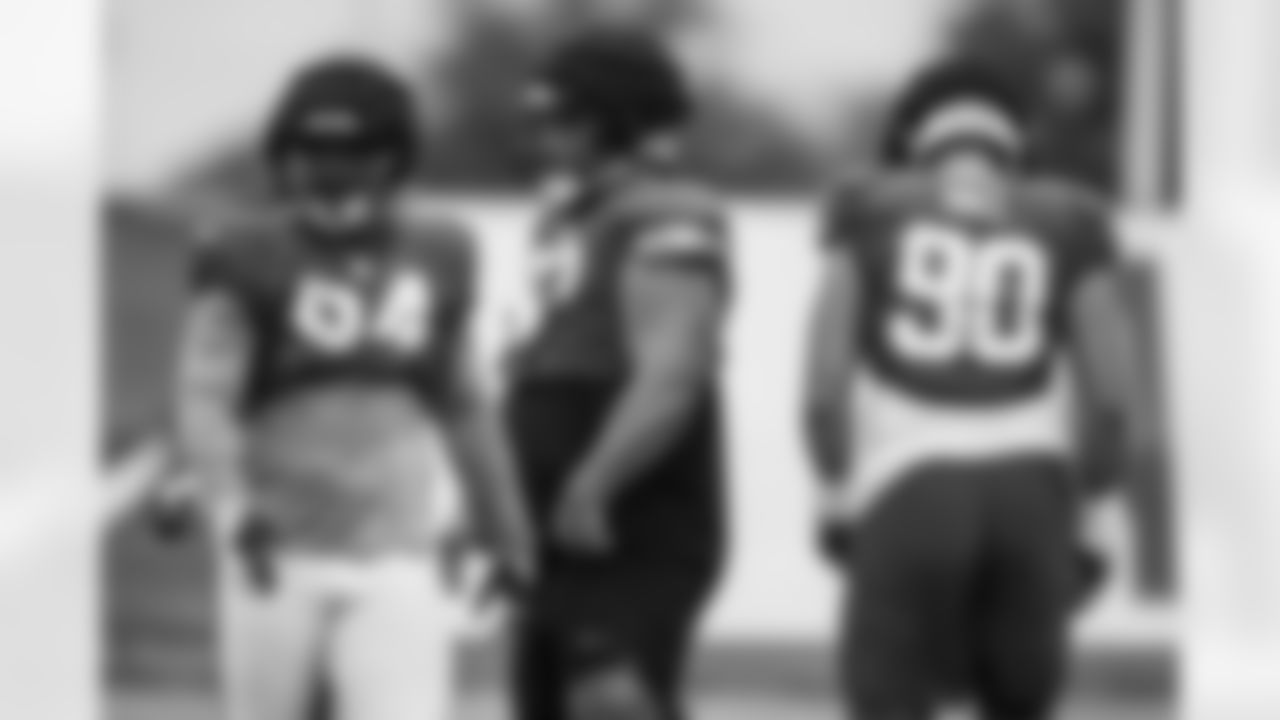
TAMPA, FL - November 16, 2023 - Defensive Lineman Calijah Kancey #94 of the Tampa Bay Buccaneers during practice at AdventHealth Training Center. Photo By Kyle Zedaker/Tampa Bay Buccaneers
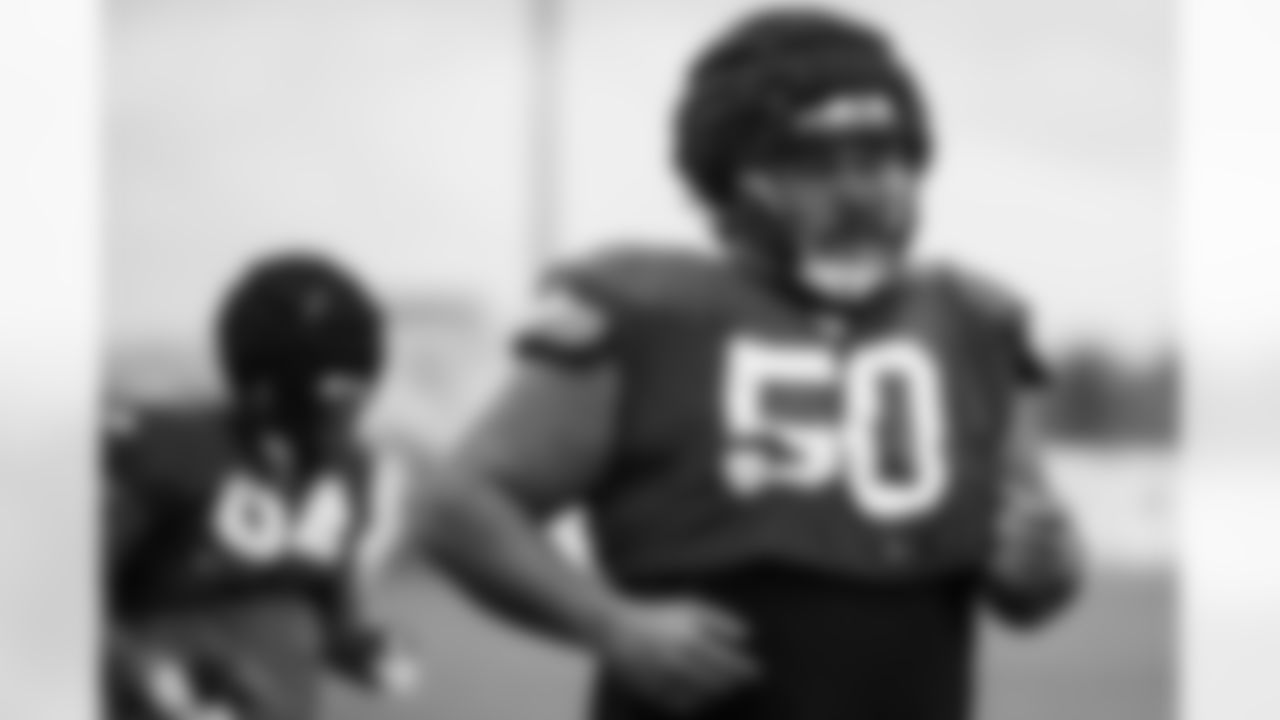
TAMPA, FL - November 16, 2023 - Defensive Tackle Vita Vea #50 of the Tampa Bay Buccaneers during practice at AdventHealth Training Center. Photo By Kyle Zedaker/Tampa Bay Buccaneers

TAMPA, FL - November 16, 2023 - Inside Linebacker SirVocea Dennis #8 of the Tampa Bay Buccaneers during practice at AdventHealth Training Center. Photo By Kyle Zedaker/Tampa Bay Buccaneers

TAMPA, FL - November 16, 2023 - Safety Kaevon Merriweather #26 of the Tampa Bay Buccaneers during practice at AdventHealth Training Center. Photo By Kyle Zedaker/Tampa Bay Buccaneers

TAMPA, FL - November 16, 2023 - Running Back Rachaad White #1 and Quarterback Baker Mayfield #6 of the Tampa Bay Buccaneers during practice at AdventHealth Training Center. Photo By Kyle Zedaker/Tampa Bay Buccaneers

TAMPA, FL - November 16, 2023 - Quarterback Baker Mayfield #6 of the Tampa Bay Buccaneers during practice at AdventHealth Training Center. Photo By Kyle Zedaker/Tampa Bay Buccaneers

TAMPA, FL - November 16, 2023 - Outside Linebacker Shaquil Barrett #7 of the Tampa Bay Buccaneers during practice at AdventHealth Training Center. Photo By Kyle Zedaker/Tampa Bay Buccaneers
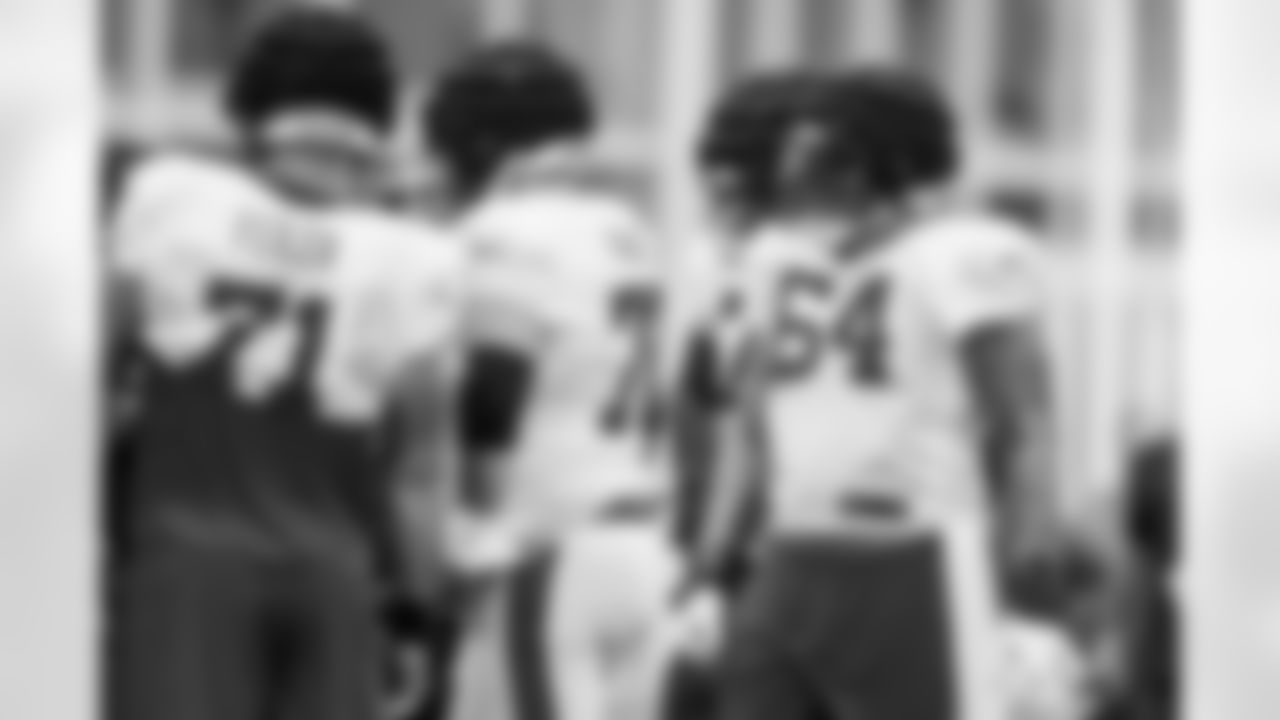
TAMPA, FL - November 16, 2023 - Guard Aaron Stinnie #64 of the Tampa Bay Buccaneers during practice at AdventHealth Training Center. Photo By Kyle Zedaker/Tampa Bay Buccaneers

TAMPA, FL - November 16, 2023 - Running Back Chase Edmonds #22 of the Tampa Bay Buccaneers during practice at AdventHealth Training Center. Photo By Kyle Zedaker/Tampa Bay Buccaneers

TAMPA, FL - November 16, 2023 - Quarterback Baker Mayfield #6 of the Tampa Bay Buccaneers during practice at AdventHealth Training Center. Photo By Kyle Zedaker/Tampa Bay Buccaneers

TAMPA, FL - November 16, 2023 - Tight End Payne Durham #87 of the Tampa Bay Buccaneers during practice at AdventHealth Training Center. Photo By Kyle Zedaker/Tampa Bay Buccaneers

TAMPA, FL - November 16, 2023 - Wide Receiver Chris Godwin #14 of the Tampa Bay Buccaneers during practice at AdventHealth Training Center. Photo By Kyle Zedaker/Tampa Bay Buccaneers

TAMPA, FL - November 16, 2023 - Quarterback Baker Mayfield #6 of the Tampa Bay Buccaneers during practice at AdventHealth Training Center. Photo By Kyle Zedaker/Tampa Bay Buccaneers

TAMPA, FL - November 16, 2023 - Running Back Rachaad White #1 of the Tampa Bay Buccaneers during practice at AdventHealth Training Center. Photo By Kyle Zedaker/Tampa Bay Buccaneers
How often have the Bucs made the playoffs after starting 4-5?
- @joeynelson19 (via Instagram)
Before I answer, I want to state that I don't think there's much predictive power here. Every season is different, and there are certainly different kinds of 4-5 starts. Off the top of my head I remember the 2011 season, the last with Raheem Morris as head coach, and that team started out 4-5 without much real evidence that it was particularly good. They then lost seven in a row. The 2003 team, which was defending its Super Bowl XXXVII championship, looked like world-beaters again to start the season but got dragged down by a number of key injuries and fluky finishes and had to limp from 4-5 to a 7-9 finish line. The 2001 team was 4-5 after nine games but truly believed it was Super Bowl contenders (and had most of the core of defensive talent that would lead it to that title a year later).
I say all this because I don't want you to get discouraged by the answer. For one thing, it's a very specific question. I mean, it's specific for the obvious reason that the 2023 Buccaneers are currently 4-5 and trying to prove that they areplayoff contenders. I get that. But if you're looking for an optimistic example of a season like this one, the 1999 Buccaneers were completely written off by local members of the media after falling to 3-4, and then ripped off six straight wins and eventually made it to the NFC Championship Game.
But I will do my duty and provide the answer, which is: Twice. The 2001 team I noted above finished 9-7 and earned a Wild Card berth, though another bad showing in Philadelphia closed the book on Tony Dungy's tenure as head coach. And, well, just last year the Buccaneers were 4-5 after nine games and ended up winning the division. I can practically hear you scoffing at that one, saying, 'Yeah, but they won it with an 8-9 record.' Well, the 2022 Bucs were tied with the Atlanta Falcons for the NFC South lead at 4-5 in a division where no obvious favorite had emerged. What's different now, a year later? The Bucs are a half-game behind the Saints at 4-5, with 5-5 New Orleans in its bye week. Isn't that reason for hope right there?
Otherwise, the Buccaneers have been 4-5 eight other times and did not make the playoffs. That was in 1978 (eventual 5-11 finish), 1987 (4-11), 1990 (6-10), 1998 (8-8), 2003 (7-9), 2011 (4-12), 2015 (6-10) and 2016 (9-7). That 2016 team could be considered an encouraging example, finishing with a winning record and only missing the postseason on a tiebreaker to the 9-7 Lions.
The worst record the Buccaneers have overcome to make the playoffs was 2-4, but that was in 1982 when a strike shortened the season to nine games and the Bucs went on a late tear to finish 5-4. The 1981 team went from 4-4 to the playoffs, and as noted above the '99 team went from 3-4 to the postseason. The 2000 team also started out 3-4 before getting to 10-6 and a Wild Card berth. The 2007 playoff team started out 4-4. Remember, the Bucs were also3-4 at one point this season, so we can take encouragement from the 1999 and 2000 teams, who like the current squad, was in the midst of a multiple seasons of contending for and reaching the playoffs.
What is the greatest Bucs game that they did not win?
- @nickpiscitelli_ (via Instagram)
This is a great question, and I think I'll give a few of my own personal favorites and let you decide which is the best.
One obvious and recent example was the Divisional Round playoff game against the Rams after the 2021 season. The Bucs were trying to capture a second straight Super Bowl title and had dispatched of the Jalen Hurts-led Eagles pretty easily in the opening round. The Rams, who would actually be the team to capture the Lombardi Trophy that season, came to Raymond James Stadium in the Divisional Round and really put a whooping on the Bucs for most of the afternoon.
Things looked bleak when Matthew Stafford ran in a touchdown to make it 27-3 midway through the third quarter…and then vintage Tom Brady appeared. As anyone reading this likely recalls, Brady led an epic comeback, which included a 55-yard touchdown pass to Mike Evans with 3:20 left in the game, and the Bucs tied the game in the final minute on Leonard Fournette's nine-yard run on fourth down. Unfortunately, the Rams had a little too much time left and a little too much Cooper Kupp for the Bucs. Back to back Kupp grabs for 20 and 44 yards put Matt Gay in position for the 30-yard game-winner. Still, to me that game is most memorable for one of the greatest comebacks – and certainly the greatest in the playoffs – in franchise history.
There's a game from the 2003 season that is flavored with bitterness in my memory banks, but if we look at it dispassionately, it was a great game played by the Buccaneers against the Indianapolis Colts in the Monday Night Football spotlight…for about 55 minutes. Keenan McCardell scored three touchdowns, Rondé Barber had a pick-six, the Bucs' offense generated 457 yards and the home team was up 35-14 with five minutes left. Yeah, the Colts had Peyton Manning, but three touchdowns in five minutes seemed impossible. It was in the bag. Then all hell broke loose. A Brian Kelly injury led to secondary breakdowns, the Colts had 90-yard kickoff return, Warren Sapp got a roughing the passer call, Simeon Rice drew an inexplicable "leaping" penalty on a missed field, and when it was all said and done the Colts had a 38-35 victory. I straight up hate that game to this day, but if you didn't have a rooting interesting it was undeniably a great game in front of a national audience.
I don't have any personal recollection of this game, but I know another famous loss in team history was a Week One 38-28 Bears win in Chicago in 1985. Now, the 1985 Bears…was that team any good? Oh, that's right, one of the greatest teams of all time, going 18-1 and demolishing the Patriots in Super Bowl XX. And how good were the Bucs that year? Well, they would finish 2-14 and wouldn't win a game until November. However, on opening day, there were the Buccaneers running all over the Chicago superteam in the first half and building a 28-17 halftime lead behind three Steve DeBerg touchdown passes. It obviously didn't last, but for at least a half this was one of the biggest upsets in team history.
In 2013, the 0-7 Buccaneers were 16.5-point underdogs as they headed to Seattle to take on the 7-1 Seahawks, who would go on to beat Denver in Super Bowl XLVIII. Incredibly, with Mike Glennon throwing two touchdown passes and running back Mike James also throwing a touchdown pass, and the defense intercepting Russell Wilson twice, the Bucs rushed out to a 21-0 lead. They were still up 24-17 in the latter half of the third quarter before Wilson led a frenzied comeback to tie the game at 24-24 and send it to overtime. The Bucs got the ball first but couldn't do anything with it and Steven Hauschka won it on a 27-yard field goal.
Now that I've given you a few others to choose from, I'll finish with what I think is the correct answer: The 1999 NFC Championship Game in St. Louis. Those were the Greatest Show on Turf Rams led by Kurt Warner and featuring Marshall Faulk, Isaac Bruce and Torry Holt. They had averaged an incredible 32.9 points in the regular season and had hung 49 on the Vikings in the Divisional Round. But the Buccaneers' defense, led by NFL Defensive Player of the Year Warren Sapp, were eager to prove they were the single best unit in the NFL. Incredibly, they did just that even though they would miss out on their first Super Bowl berth. Through more than three-and-a-half quarters, Tampa Bay's defense held Warner and company to just a single field goal, with their other two points coming on a safety off a bad snap. The Bucs led 6-5 and had the Rams in a third-and-four at the Tampa Bay 30. The Buccaneers brought a blitz and Brian Kelly had one-on-one coverage on Ricky Proehl on a go route. Kelly provided excellent coverage but Warner was still able to drop a perfect pass just over his hand and into those of the receiver for the game-winning score. The Bucs tried to rally in the final five minutes and got down to the Rams' 22-yard line, but a sack of Shaun King by Grant Wistrom and a Bert Emanuel catch infamously and mistakenly reversed snuffed out the comeback and the Rams won, 11-6.
What is your hot Thanksgiving take?
- @shirleyb96 (via Instagram)
I'm not sure I've got any actually hot Thanksgiving takes. Maybe a few lukewarm ones.
I have no need for white meat turkey; the dark meat is far better. The only exception to this is with the leftovers. White meat on white bread with mayonnaise makes for a classic day-after-Thanksgiving sandwich.
My favorite Thanksgiving side dish is broccoli-rice-cheese casserole. I don't know if that's a hot take, but maybe some people wouldn't consider that a traditional holiday side dish.
Pumpkin pie with whipped cream and pecan pie with ice cream are both delightful desserts. Remove the whipped cream and the ice cream and I have no use for them.
The most important single item in a Thanksgiving spread may be, yes, the gravy. Mashed potatoes, stuffing and even turkey really need gravy to get to their peak deliciousness and edibility.
Very few people get homemade mac and cheese right. I can't really complain or criticize because I don't know how to make it and I never have, but I've been told by savvier chefs that the key is to make a roux to begin with. This is how you get creamy mac and cheese, but a lot of the homemade varieties don't seem very creamy to me. Now, maybe that's how a lot of people like it and more power to them, but it doesn't move the needle for me.
How'd I do? I know, kinda boring, right?
Imagine a situation where a receiver gets wide open and catches a long ball on the 20 yard line. The closest defender is 40 yards away, and the defense gives up and does not chase him since they think he is going to score. Could the receiver literally stand still and waste as much time as possible? Is there any penalty against that (or could the ref blow the whistle since there is no forward progress?
- Zach B (via email)
Well, of course he could. Why wouldn't he be allowed to do that? A whistle blows for the lack of forward progress when a ballcarrier has that forward progress stopped by the defense. If a running back takes a handoff or a screen pass and stops for a second or two to let blocks develop, the refs don't blow the whistle. Or when a back reverses course and ends up going backward for a while – which is obviously not forward progress – they don't blow the play dead.
I've seen a few instances of a player with the ball dilly-dallying near the goal line for a few seconds before going in as he tries to kill time at the end of a game. Usually it's just a couple seconds because a defender is closing in, but I don't see why there would be any difference between standing there waiting to go into the end zone for two seconds or for 40 seconds. It's up to the defense to wake up and chase him into the end zone.
How many times have the Bucs not allowed the other team to score a TD all game?
- @marcpiliero (via Instagram)
That has happened 64 times, including the playoffs, most recently of course last weekend's 20-6 win over Tennessee. The Bucs also kept the Saints out of the end zone in a 26-9 win in New Orleans in Week Four.
The list starts with the 10 shutouts in franchise history, seven of which came between the 1998 and 2004 seasons. The Bucs most recent shutout win was a 21-0 decision in San Francisco in 2010. The Bucs have not won all 64 of those games, but they are 56-8 when not allowing a touchdown. The most recently loss without allowing a touchdown was the 9-0 blanking delivered by New Orleans at Raymond James Stadium in 2021.
I would say the best and most memorable Buccaneers game in which its defense did not allow a touchdown was Super Bowl LV. I find it incredible to this day that Tampa Bay's defense held the Patrick Mahomes-led Kansas City Chiefs to just a trio of field goals in a 31-9 win. That was the first time the Chiefs had failed to score a touchdown in a game started by Mahomes.



































